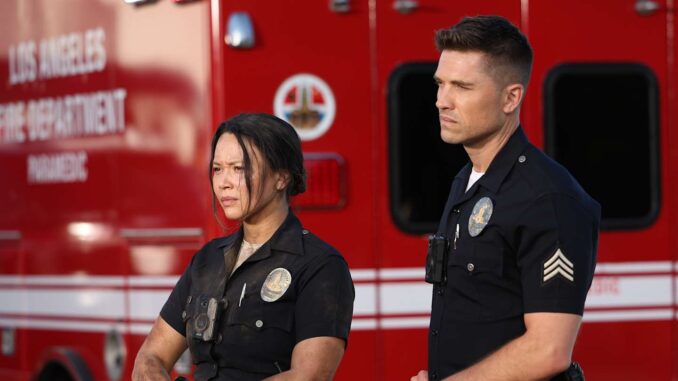
The Golden Goose and the Looming Shadow: Why The Rookie Risks Relying Too Heavily on Chenford Romance
In the ever-evolving landscape of network television, few shows manage to capture the elusive blend of action, drama, and character-driven storytelling quite like ABC's "The Rookie." Initially lauded for its fresh take on the police procedural – a middle-aged man pursuing his dream of becoming a cop – the show thrived on its ensemble cast, the grit of street-level policing, and the intricate ethical dilemmas faced by its characters. Yet, in recent seasons, a subtle but significant shift has occurred, pulling the narrative increasingly towards the magnetic, slow-burn romance between Officers Lucy Chen and Tim Bradford, affectionately dubbed "Chenford." While undeniably a fan favorite and a ratings boon, this burgeoning reliance on Chenford, much like a prospector fixated solely on a single vein of gold, risks diminishing the very rich, diverse ore that once made "The Rookie" a compelling watch.
The initial appeal of Chenford was undeniable. Their relationship evolved organically from a gruff, by-the-book training officer and his eager, empathetic rookie. Their dynamic was built on mentorship, mutual respect, and a palpable, unspoken chemistry that simmered beneath the surface of their professional interactions. Viewers watched them grow, both individually and together, through intense situations, personal struggles, and the shared camaraderie of the job. Lucy's growth, spurred by Tim's often tough but ultimately caring guidance, and Tim's own softening, influenced by Lucy's emotional intelligence, made their eventual romantic pairing feel earned and deeply satisfying. It was a testament to the show's ability to develop characters over time, allowing their connection to mature alongside the overarching procedural plots. This slow-burn was the golden goose, laying valuable, engaging eggs of narrative tension and emotional payoff.
However, once the "will-they-won't-they" tension resolved and Chenford officially became a couple, the show seemed to disproportionately allocate its narrative eggs into this single basket. What was once a compelling subplot began to dominate, overshadowing other crucial character arcs and the show's foundational premise. Scenes that once focused on complex police cases, Nolan's struggles with leadership, or Angela and Wesley's domestic and professional challenges, now frequently pivot back to Chenford's domestic bliss, minor relationship squabbles, or overly saccharine interactions. Lingering glances during a briefing, private jokes during a tense stakeout, or a disproportionate amount of screen time dedicated to their shared living arrangements begin to feel less like natural character moments and more like deliberate fan service, designed to appease a vocal segment of the audience.
This over-reliance carries significant risks, primarily to the ensemble nature of the show and its original themes. John Nolan, the titular rookie whose journey was meant to be the show's anchor, often finds his storylines relegated to supporting roles or ethical dilemmas that lack the same narrative weight given to Chenford's latest date night. Other compelling characters, like the driven Detective Angela Lopez, the morally complex Wesley Evers, or the new rookies Aaron Thorsen and Celina Juarez (whose own "rookie" journeys should be central), frequently feel like orbiting satellites in the Chenford universe. Their professional triumphs, personal heartbreaks, and growth as law enforcement officers become secondary, robbing the show of the rich tapestry of diverse experiences that once defined it.
Moreover, relying too heavily on a resolved romantic pairing introduces a narrative challenge: what comes next? The thrill of the chase is over. While domesticity and shared life can offer moments of drama, they rarely possess the same inherent narrative propulsion as a burgeoning romance or a life-or-death police case. If every plot point must somehow involve or reflect on Chenford's relationship, the show risks stagnation and predictability. Viewers who were drawn to "The Rookie" for its procedural elements, its exploration of law enforcement ethics, or its diverse ensemble might find themselves alienated, as the show transforms into a romantic dramedy with police sirens in the background. The risk is that the golden goose, perpetually forced to lay the same type of egg, will eventually cease to be special, becoming merely common.
In conclusion, the Chenford romance, initially a brilliant narrative stroke, now casts a long shadow over "The Rookie." While its popularity is undeniable, the show's increasing dependence on it threatens to dilute its original strengths: its compelling ensemble, its grounded portrayal of police work, and its nuanced exploration of individual character journeys. To regain its full narrative vibrancy, "The Rookie" must remember that its strength lies not in a single, shiny vein of gold, but in the rich, complex, and diverse landscape of its entire world. The golden goose is valuable, but a balanced ecosystem of storytelling ensures the entire farm thrives.